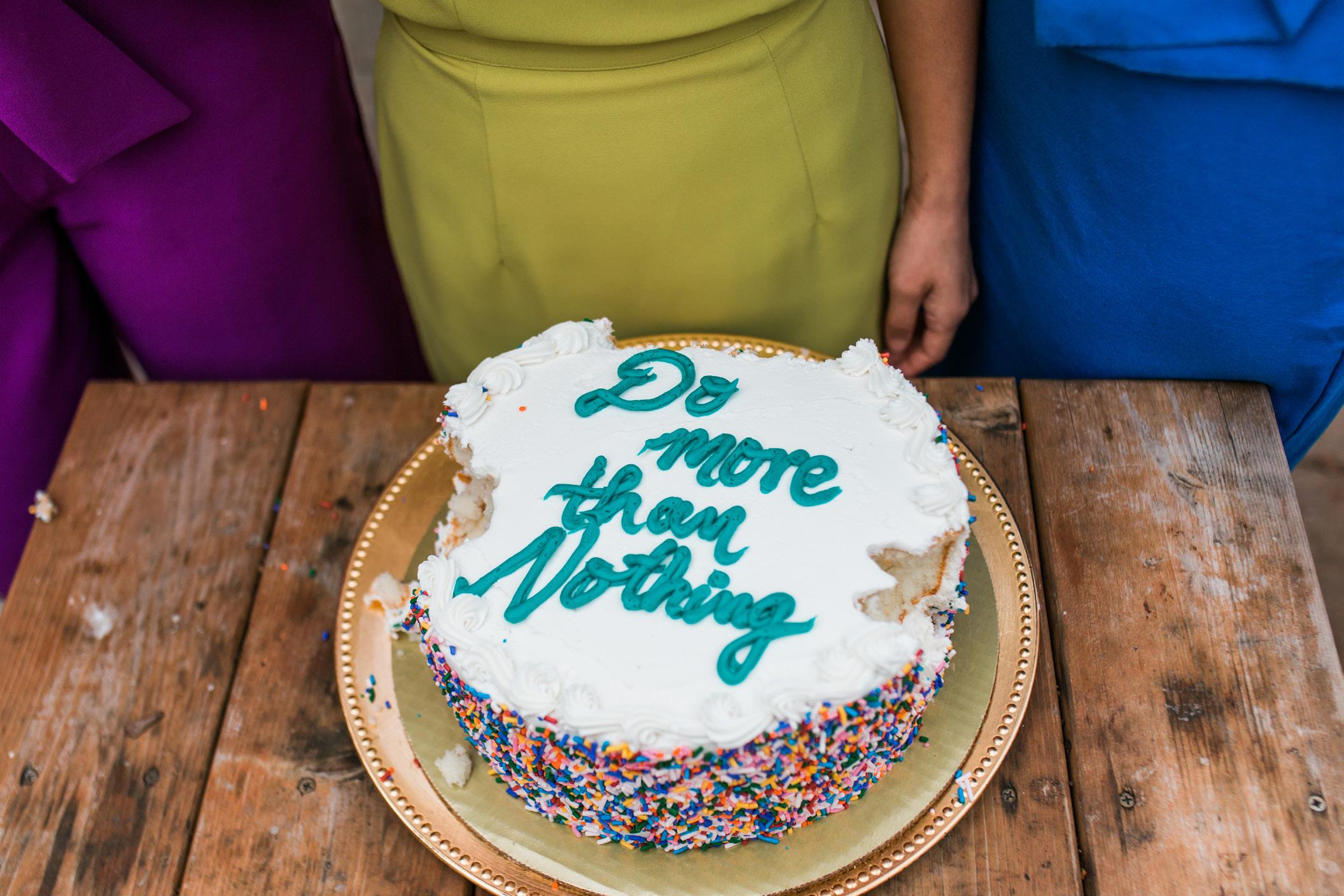
25 minute read
SEE HER WORK Street Artist Phoebe Joynt
from March 2020
ON THE STREET Phoebe Joynt translates her love of street art to the walls of Austin.
BY COURTNEY RUNN
Awall in Austin is never vacant for long. The hashtag #austinmurals currently boasts more than 14,000 Instagram posts, showcasing the best of the city’s murals, from the famous (“You’re My Butter Half” and “I Love You So Much”) to the more obscure. They make for great selfie backdrops but, for the artists, they can provide a crucial chance for exposure and revenue.
New York native Phoebe Joynt moved to Austin in 2017, and in 2019, left behind her graphic-design job to become a full-time artist. Inspired by the snowboarding shops and skating rinks of her childhood, Joynt gravitates toward the bold colors and bright graphics of modern street art. Her tallest mural to date was a 20-foot tall project for Facebook during South By Southwest; her widest was 40 feet along Cesar Chavez Street and I-35.
“I think of New York City in the ’80s where [graffiti] was totally seen as an illegal crime,” Joynt says. “If you were out tagging, you could get arrested, go to jail and I think now more cities are not seeing it as a criminal activity. More people are seeing it as an expression of art which is what I think it always was.”
When she first moved to Austin, Joynt started painting at the original HOPE Outdoor Gallery, meeting other local artists and people from around the state. Without a marketing budget, she’s relied on those organic connections and social media to be able to pursue art full time.
“A lot of people tag the artists of the art they take photos in front of and I think that opens up the artist to have an even bigger network and more eyes on their work…We get to see murals luckily everywhere because it’s totally opened up the art community and allowed more opportunities for people like to me to become full-time artists, because of this need now for businesses and consumers who want to engage with artwork,” she says. “I think it’s awesome.”
Joynt begins her murals and canvases the same way: sketching digital renderings on her computer. Next, she translates it to her canvas, working off a grid system or projecting her renderings before picking up a spray can. Except for enlisting the help of friends to buff walls for larger murals, it’s a one-woman show. Her biggest private commission—4 by 5 feet— took about a week and a half’s worth of work while her SXSW mural included a week of 10-hour days.
“I traded in a 9-to-5 for a 12-hour work day working for myself but it almost doesn’t drain me as much as the 9-to-5 did because I think I’m super involved and passionate about everything I’m working on…sometimes [I] forget it’s even work,” she says.
To celebrate her one-year anniversary of pursuing art full-time, Joynt is marking another milestone: her first solo exhibit. This March, she’s opening “Hello My Name is Phoebe,” featuring more than 35 original pieces at Austin Art Garage. A fitting capstone to a year of work, the show has truly been a lifetime in the making: “It’s great to be able to know what you want to do when you were little and [to] be able to say you’re doing it now is so cool.”

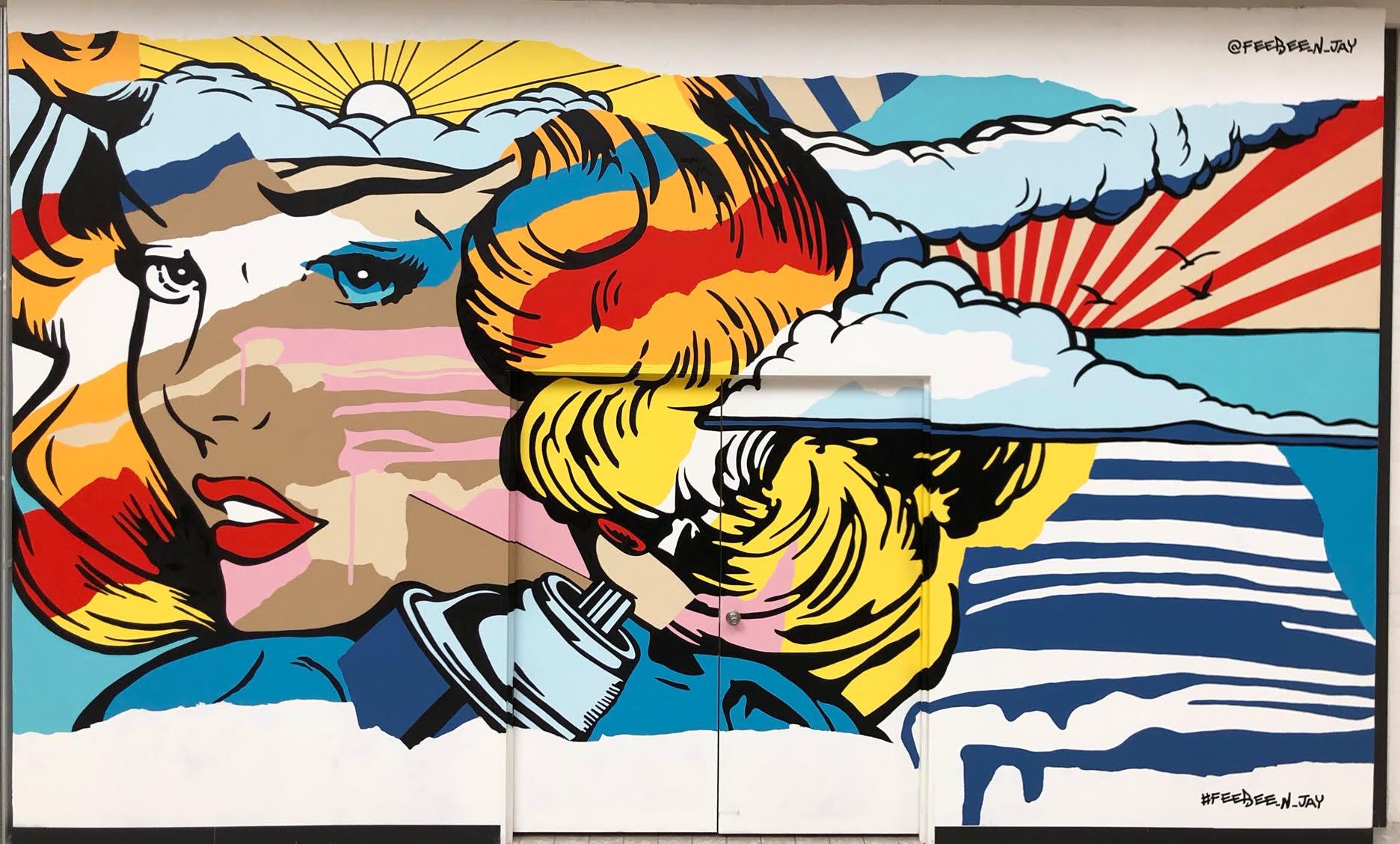
“” I think the Austin art community is super special, in that, at the end of the day we all want what’s best for each other, and I think that’s super rare in a lot of industries.

EVANGELIST FOR CHANGE
Political analyst and social-justice advocate Jehmu Greene is on a relentless mission to empower women and fight for change.
BY HANNAH J. PHILLIPS PHOTOS BY ANNIE RAY
MAKEUP BY GERTIE WILSON STYLED BY NIKI JONES SHOT ON LOCATION AT ARRIVE AUSTIN
Jehmu Greene has never doubted that a woman’s place is in the house—and the Senate. Born in Washington, the vivid imagery of the White House and national monuments instilled in her a strong desire to participate in politics while she was still in preschool. Moving to Texas at the age of 5, Greene recalls the impact of local female political leaders like Mayor Carole Keeton, Barbara Jordan and Wilhelmina Delco on her childhood.
“It was embedded within my understanding at an early age that women were political leaders,” she says. Greene’s parents emigrated from Liberia on student visas to pursue degrees in political science, but when political unrest unfolded in Liberia, they remained in America once their visas expired. Since her other family members were involved in politics (her grandfather had served as postmaster general and her dad’s cousin was vice president), several of them escaped to America to join her parents. Growing up as the daughter of undocumented immigrants not only impacted Greene’s political values later in life, but also gave her the confidence she traces through her entire childhood and career. Returning to Washington after a brief stint at the University of Texas, she built an impressive resume as the director of women’s outreach at the Democratic National Committee (DNC), president of Rock the Vote and national director of Project Vote. Greene has worked on more than 20 political campaigns—including Hillary Clinton’s 2008 presidential campaign—and served as president of the Women’s Media Center. Her driving force has always been a strong desire to empower the disenfranchised and engage the marginalized, which she currently channels through her work empowering women to run for office at VoteRunLead.
52 | AUSTIN WOMAN | MARCH 2020 Outlining the milestones that have shaped her political activism, Greene remembers the pivotal moments that made her an evangelist for change. Some of her earliest memories are listening to her parents discuss the 1980 Carter/Reagan election with their friends and fellow academics.
“If you’ve spent a lot of time around first-generation immigrants,” she says, “you know they are very plugged into the political happenings of the country they have immigrated to.” Greene’s first childhood home in Austin was in marriedstudent housing in the Colorado Apartments on Lake Austin Blvd while her parents studied at UT.
“On the one hand, you don’t expect luxury in UT student housing,” she laughs, “but it was also lakefront property. We could walk out the door and play at Town Lake, which is the beauty of Austin.”
In addition to her early immersion in nature and frequent political discussions at home, Greene recalls being surrounded by a strong international community while growing up in the Tarrytown neighborhood. As the feeder school for the children of international students attending UT, Matthews Elementary provided a diverse student body comprised of cultures all over the world.
“There was something like 100 countries represented at one point,” Greene says, “which has an impact on how you see the world, as well as the spaces you’re comfortable in and know are possible. I would not be who I am today without that diversity, and all of my work to engage the vulnerable and marginalized came from that space Matthews created.”
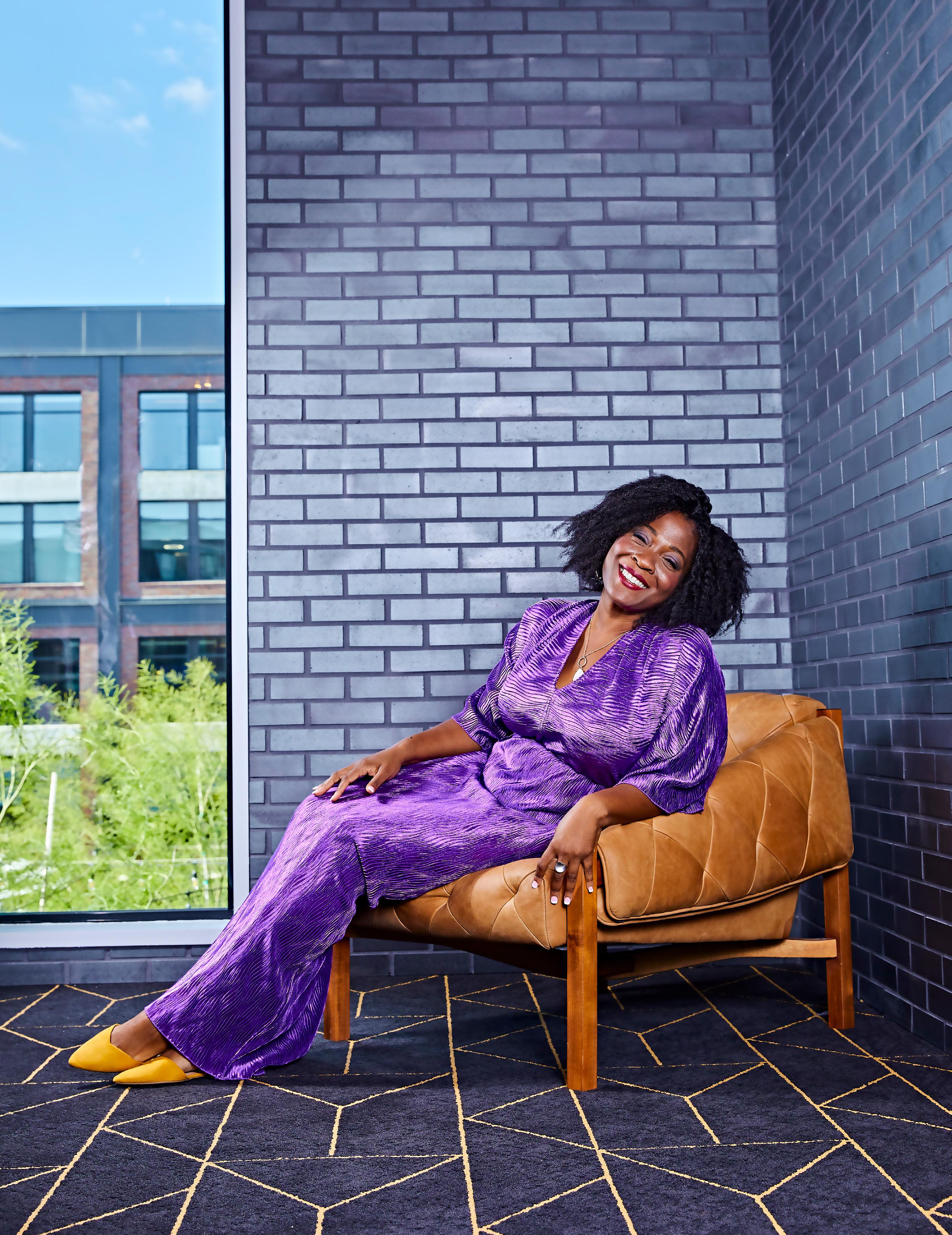
Throughout elementary school, Greene participated in the gifted and talented program, which often meant that she was responsible for helping other children learn English. Whether teaching kids from Mexico or Hong Kong, Greene witnessed the tremendous lack of access people have to the world around them when they can’t communicate. Helping fellow students navigate school in a new country sparked her earliest desires to empower underrepresented communities by giving them a voice.
Greene also started exercising her own voice in the classroom, which often got her in trouble as she was the first student to disagree with the teacher and question the process. While Greene’s parents welcomed her outspokenness, they didn’t always welcome the challenges that came with it. “Arguing about politics is part of Liberian culture,” she says, “but when you’re working three jobs, it’s hard to go in and talk to the principal about your daughter’s behavior.”
After one particular parent/teacher meeting in the first grade, Greene vividly remembers her mother’s surprising reaction.
“The teacher complained that other kids listened to me more than to her, and I thought I would be in a lot of trouble,” Greene laughs. “Instead, my mom just said, ‘There will be a lot of people who won’t like you because of your strong opinions—and you need to get used to it.’” In high school, Greene’s voice and opinions only grew louder and stronger. At one point, she called out fellow students for ostracizing certain groups from pep-rally preparations when they hosted painting parties in their homes instead of at school. Later, she asked to participate in the Ugly Man contest, which had traditionally only allowed senior males to dress up in costumes.
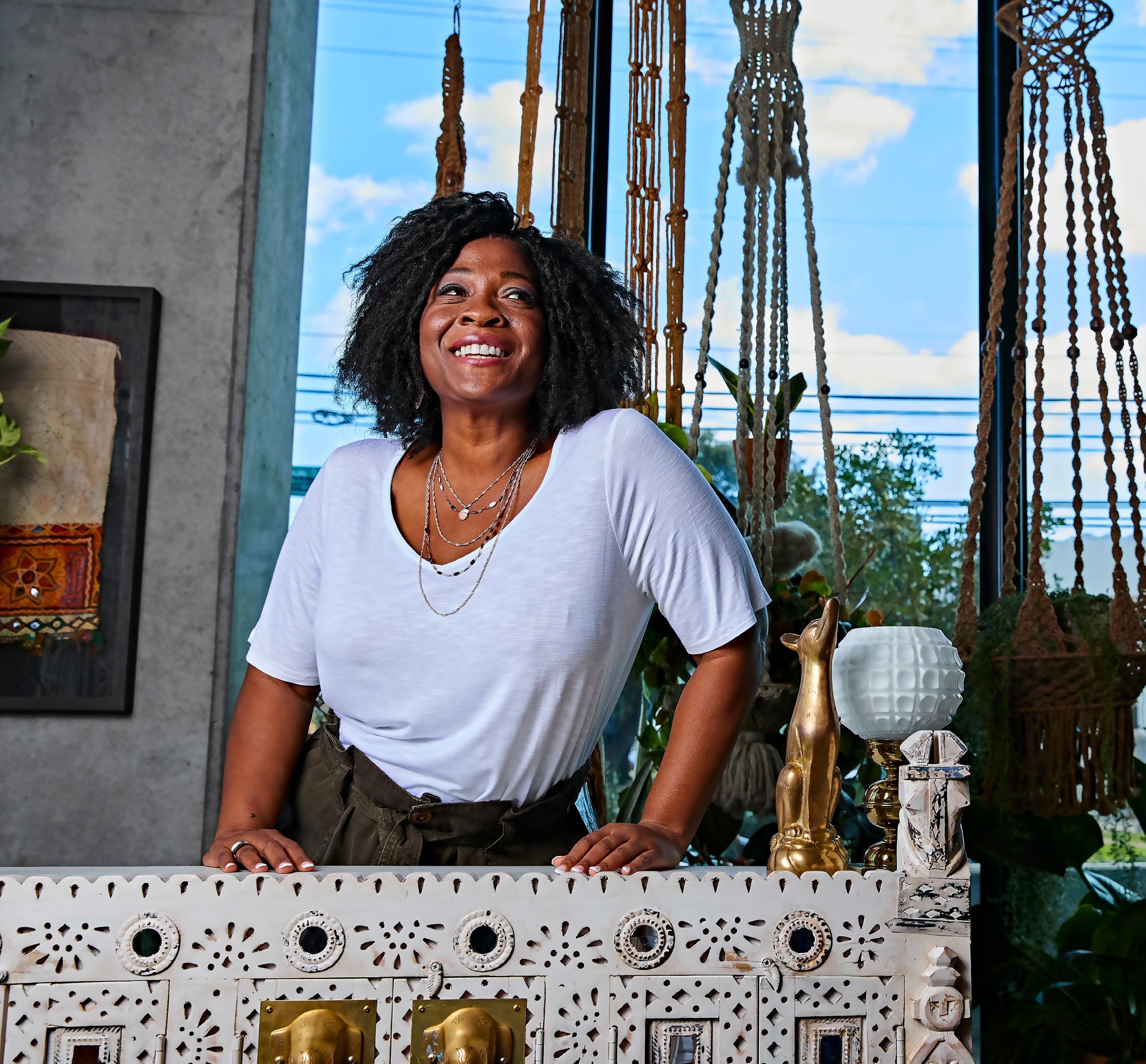
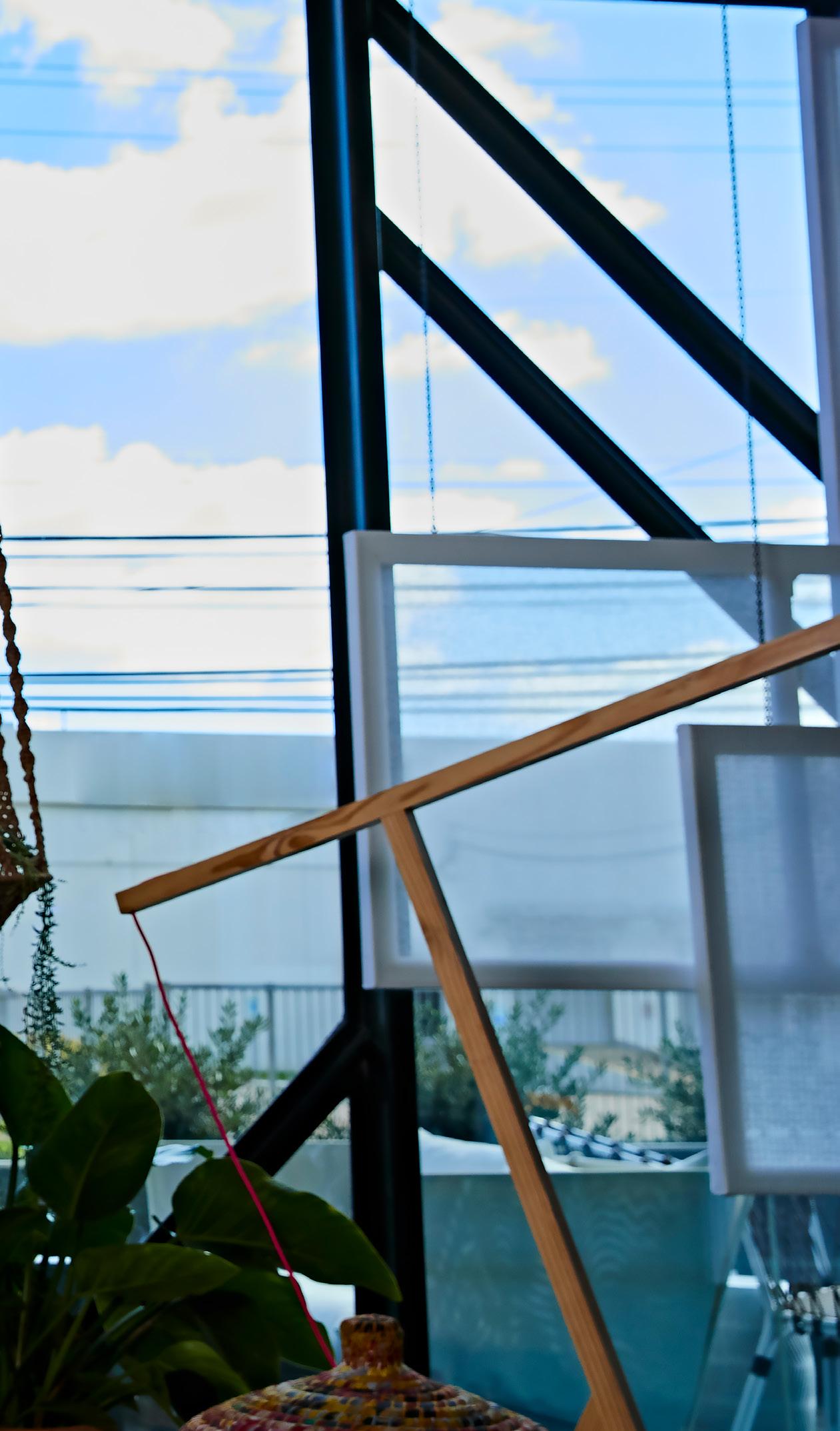
“I did things like that a lot in high school, but my first real campaign was for prom queen,” she says. “I wanted my friend, John Rey, to be king. He was gay, so I wanted to give him my crown.”
Throughout high school, Greene continued using her voice to support causes close to her heart. She participated in student council and started Students Against Drunk Driving, but the pivotal moment came when she went to cast her first ballot in the 1990 election. Walking proudly up to the poll station on the UT campus, she still remembers the excitement and responsibility she felt about voting for the first time— and then the horror when she learned there was an error with her registration. She begged and cried and pleaded, but she could not receive a provisional ballot. “That moment still reverberates in my life today,” Greene says. “I felt powerless, and I don’t want anyone to ever feel powerless. There are forces in this country that are purposely designed to make certain communities feel powerless; from that moment on, I decided to do everything I can to make sure communities don’t feel that way.”
While studying at UT, Greene joined the Texas Young Democrats and eventually became the executive director. She also joined the Neighborhood Longhorns Program, which provides mentoring and tutoring to local students more likely to drop out of school. The more she volunteered with these organizations, the more she gravitated toward environments where she could see the direct impact of her work.
“Doing the actual work of providing services to people who need it and helping them find their voice became much more compelling than sitting in the classroom and having theoretical conversations about social change,” she says. With that in mind—and with $10 in her pocket— Greene left her studies and returned to Washington to chase her childhood dreams. Driven by her desire to engage more young people in the voting process, she sought a job as national youth vote director for the 1996 Clinton campaign.
“I was 23,” she says. “I had no job; I just had the vision. What I ended up doing was actually bigger than what I had envisioned, which became the theme of my early career.”
Despite not landing her dream job, Greene was hired as a program assistant for Center for Policy Alternatives that helped her build her network in Washington. Before long, she became an assistant to Sylvia Panetta, who at the time was on the Joint Committee on Inaugural Ceremonies and whose husband was chief of staff at the White House. “So many things came from being in that space and taking advantage of those opportunities,” Greene says. “Those early opportunities prepared me early on to be the youngest person, the only woman and the only person of color in those rooms—and to feel confident making sure my voice was heard.”
Those early career experiences continued to sharpen her determination to bring other unheard voices and underrepresented communities to the table. In 2000, she became president of Rock the Vote, a nonprofit whose mission is to engage more young people in the political process. During her tenure as president, she says membership grew from 1,500 to 1 million by 2005 while youth voter turnout grew by 11 percent, a figure she remains proud of today.
“I think as women we should celebrate our accomplishments and I recognize that I had significant success at Rock the Vote,” she says. “The decisions I made helped millions of people vote.”
Her tenure at Rock the Vote opened her eyes to the extreme lack of civic education among young people. The group received countless calls on election day from new voters unaware they needed to register prior to voting, which Greene partially attributes to bipartisan divides at the most basic level in public-school education.
“We are so divided as a country at times,” she says, “that even our education is being framed within these partisan lines. And we’re gonna have to find a way to fix that.”
Today, Greene continues to work toward that solution in all of her endeavors, but she is particularly passionate about her work with VoteRunLead. Started in 2014, the nonprofit is now the largest, most diverse candidate-training organization for women in the country.
“We’ve helped more than 35,000 women run for office—and win,” she adds, smiling.
A founding board member, Greene travels the country to lead comprehensive training programs focused on helping women see they already have the skills, experience, talent, vision and passion to lead. “Because we are so thorough and want to do a perfect job, women often think we need more time in a specific job, more education or more initials at the end of our name before we can consider leadership in a public-service position,” she says. “So, a lot of the training I do at VoteRunLead is just helping women understand there’s nothing else they need but this moment.”
Greene encourages her trainees to consume content from a wide spectrum of media outlets, advice she offers to anyone seeking to be an active member of their community regardless of public office.
“Our current media infrastructure has done great harm to embracing critical thinking, so the news we consume can’t come from simply sources that regurgitate our own thoughts,” she says. “You can’t be an expert on any issue unless you know how your opposition frames it.” As a political analyst for Fox News for the last 10 years, Greene walks the talk, unapologetically defending progressive policies on a largely conservative news outlet. Her views have earned her negative feedback—to put it mildly—from both conservative viewers and her progressive peers, but Greene believes she has a responsibility to share the life experience and perspective from different communities on the network.
“I’m not going to spend an hour and half in hair and makeup to go chat with an audience that agrees with me,” she says. “It’s an incredible opportunity to be able to impact how someone might view a community of people and provide a different perspective.”
Through her work at VoteRunLead, she hopes to encourage more and more women to do the same. In Austin specifically, she has also joined and helped create local initiatives and events, like #tribWomenInspire. With a goal to create more space for diversity and women’s leadership in the city, the program launched during the 2019 Texas Tribune Festival to honor the advocacy of author Piper Kerman. Greene hopes to curate the same kind of environment she remembers from her childhood experience at Matthews Elementary.
“When I first moved back to Austin, it became clear that the spaces familiar to me growing up are much harder to find, so my goal is to help Austin become the community I know it can be,” she says. “My direct personal experience created a version of the city that is possible with a little intentionality; when you invite people into the community with a different opinion and different life experiences, everyone wins.”
ARRIVE AUSTIN
Arrive Austin is an 83-room hotel on the corner of East Sixth Street and Chicon built to welcome people to the neighborhood. Upon arrival, guests check in at the bar where their welcome drink and snack is on the house. Here, opposites attract as modern industrial finishes meet bright cosmic collages by Sarah Presson. Each room is outfitted with custom Wood Castle millwork, an Apple TV, Marshall speakers and Brooklinen bedding and Turkish towels. Marble-accented bathrooms feature floor-to-ceiling subway tile and come stocked with Niven Morgan’s aromatic bath essentials. When hunger sets in, Vixen’s Wedding serves up Goanand Portuguese-inspired family-style eats and Lefty’s Brick Bar crafts banh boys and frosty cocktails worth sticking around for. On the second floor deck, Gin Bar pours more than 90 gin varieties from Argentina to New Zealand while Cartel Coffee Lab keeps the third-wave caffeine game strong downstairs. For more information, please visit arrivehotels.com/austin or follow @ArriveHotels, @LeftysBrickBar, @GinBarATX, and @VixensWeddingATX on Instagram.
Page 53: Ivory druzzy pendant necklace, $16; hoop earrings, $12.95, available at Maurices, 10515 N. Mopac Expy., maurices.com; dress, shoes and ring, model’s own.
Page 54: Flawless solid tee, $24; olive paper-bag-waist pants, $44; layered necklace, $14.50, available at Maurices, 10515 N. Mopac Expy., maurices.com.
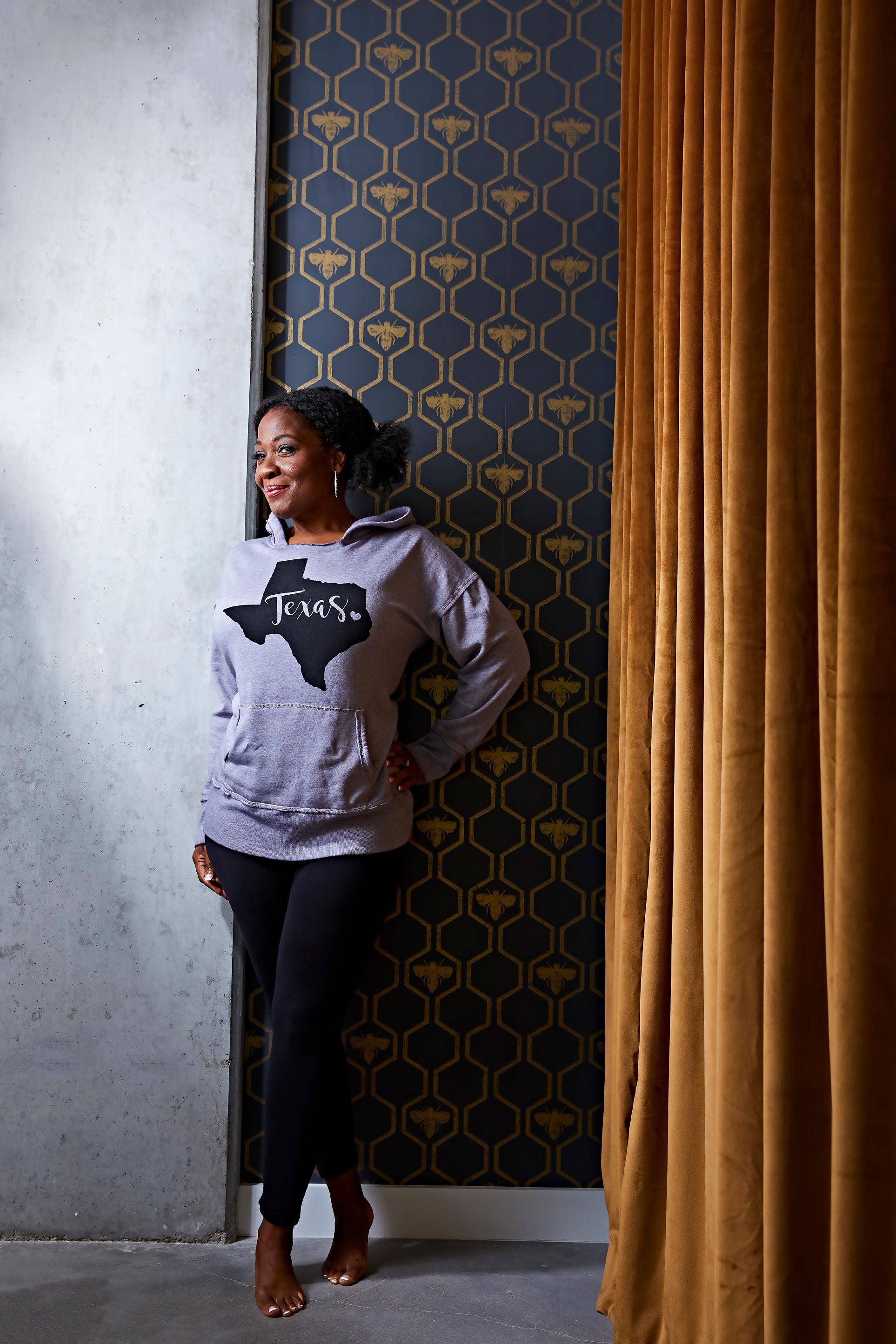
MORE THAN NOTHING
The women of the The Rabble are crushing political dread one to-do list at a time.
BY BRIANNA CALERI PHOTOS BY TAYLOR PRINSEN
It’s Friday night at Cheer Up Charlie’s and Kristen Gunn can’t stop thinking about Butterfingers. She and Ashley Cheng, the two thirds of the progressive political organization Rouser who don’t have the flu, are recording a live on-stage episode of their podcast, The Rabble, at Boss Babes’ annual State of the Uterus. The topic of the night is sex education. They challenge the audience to a multiple-choice quiz on abstinence metaphors used in state-sanctioned sex-ed textbooks. But what they pose is a trick question, since all three answer choices have been taught in Texas schools to encourage students to not have sex until marriage, including a Butterfinger metaphor, as in: “Would you rather be a whole Butterfinger, or a chewed-up Butterfinger?” Gunn spews her mangled Butterfinger from the stage in laughter.
It’s a bad metaphor for sex-ed, but the night perfectly represents the unruly glee of The Rabble. With the addition of Becky Bullard, the three women call themselves an “unruly mob,” and they live up to it. Their goal is to demystify Texas politics and encourage action, demonstrating the transformative power of local government. They achieve it by cursing, punning, laughing and crying in a roundtable format with a guest every week. And they don’t hide their lack of political expertise; if they can do it, they emphasize, anyone can.
Bullard brought Rouser together. She had known Cheng for a while, as their paths kept crossing through mutual friends and a shared stint on the leadership board of Slow Food Austin. They drifted apart, but stayed connected on social media, where Cheng would post about activism. After the 2016 election, Bullard decided she wanted to learn to be an activist. She went to Cheng in search of a buddy for her journey.
58 | AUSTIN WOMAN | MARCH 2020 Gunn, fittingly, is a frequent provider of non sequiturs on The Rabble, who got involved by coincidence. She regularly attended community meetings and was excited to spot a woman who wasn’t decades older than she was. She approached Bullard, recognizing a familiar energy in her “vibrating need to do all the things.” The Rabble was conceived through a desire for community engagement. With positivity and a willingness to publicly discuss their own mistakes, Rouser built a community for people who care but don’t know how to take consistent action. “I wanted everyone to know that I didn’t know what I was doing,” Cheng says, “and that we should all not know what we’re doing together and figure it out.”
Through polling, they found their target audience typically faces three roadblocks to political engagement. In Gunn’s words, “People are turned off by politics because it’s a bummer, people don’t feel like anything they do will matter or people don’t see any clear way to help.” The Rabble provides a leg up in every category, with positivity and accessibility, stories of success and stories of further need, and weekly assignments.
“We’re like Lisa Frank goes to the capitol,” Bullard says, smiling.

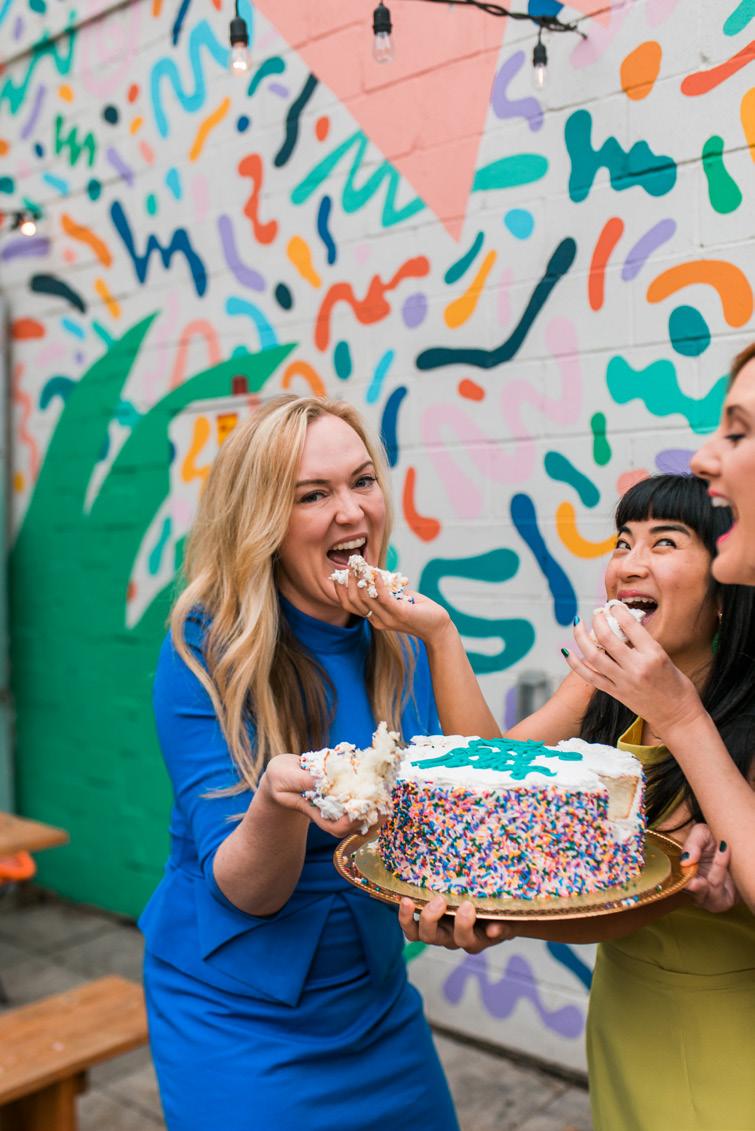

POLITICS ARE NOT A BUMMER Most traditional etiquette tells us to avoid politics at all costs when speaking to family, coworkers or friends we don’t want to lose. Politics are for arguing, and proving things, and if you’re not mad, you’re not paying attention. It is sometimes a misguided badge of honor, Gunn points out, to insist we are above politics.
“‘I don’t like politics’ is synonymous with saying, ‘I’m not petty,’” she says. But to have a political opinion requires knowledge of a complicated system that few fully understand and sharing it risks getting called out or “cancelled” when people don’t agree. In short, being involved in politics means being involved in being wrong. And The Rabble is here to teach you how to be wrong in the right way. The first step is recognizing the difference between intent and impact. In season two, on the episode “Building a More Intersectional Texas with Measure,” listeners meet two women who work for the Austin-based organization Measure and embody a healthy partnership between a community and its allies. Founder Meme Styles educates on black stereotypes and statistics while Janis Bookout, the white director of performance and evaluation, joins the conversation to shepherd white listeners through confronting benevolent prejudice within themselves. This symbiosis echoes the relationship between The Rabble and its featured guests: One creates a learning space that is empowered by humility, while the other provides the hard facts and lived experience.
In that same episode, Bullard shares a personal story acknowledging the racial bias she will already have to help her 5-year-old undo. Bullard relishes the power of personal stories, saying she hopes hearing about a mistake “gives our listeners permission to forgive themselves for when they screw up, too.”
Letting go of defensiveness, then, allows for a release of uptightness. The unapologetic positivity within each hour ranges from cathartic outbursts (gleefully shouting, “Ew!” at the mention of Texas Rep. Chip Roy) to disarmingly sincere interjections of gratitude for each other. Even exercising their rights to frequent bouts of crying feels like rebellious, reimagined positivity—it’s their podcast and they’ll cry if they want to.
Lightening the mood around topics as heavy as abortion, family separation and gun laws is hard, but necessary work to undercut intimidation and keep the activism flowing. Cheng, especially, leans on dry humor and a heavy coating of irony to discuss bad situations without losing momentum. She sees the privilege that kind of positivity takes, and all three use it to convert disheartening realities into rowdy brunch talk.

THE THINGS WE DO MATTER Positivity is a powerful motivator, inspiring people to face intimidation, past failures and negative perceptions. Social-justice activist Adrienne Maree Brown coined the term “pleasure activism” to describe the philosophy that politics can and should be fun. In order to create sustainable movements, people have to avoid burnout and feel inspired. After drawing in political skeptics with its contagious positivity, The Rabble’s next mission is to show listeners that their participation matters.
Much like the women who dubbed themselves “nasty women” in 2016 after a derogatory comment by President Donald Trump, The Rabble founders identify as an “unruly mob” as an homage to Wendy Davis’ infamous 2013 filibuster. The Texas Legislature was poised to pass an antiabortion bill when Davis took the floor seven years ago. Armed with personal stories from supporters, Davis set her sights on midnight, 13 hours away. Her filibuster continued until the Republican Lt. Gov. David Dewhurst ruled her out of order.
As Davis’ turn to speak ended, other legislators started raising their own voices. In a pivotal moment, Sen. Leticia Van de Putte shouted, “At what point must a female senator raise her hand or her voice to be recognized over the male colleagues in the room?” Rabble rousers on every level of the capitol building rotunda started shouting; the noise crescendoed as protestors in the hallways and outside joined in. The Senate, unable to vote over the chaos, let midnight pass, and the new day swept the bill away with it. Dewhurst told reporters, “I didn’t lose control of what we were doing.” Instead, he complained, “We had an unruly mob.”
Just as Davis relied on the stories of Texas women to delay the bill, The Rabble leans on its guests to be the voices of the state. Gunn, Cheng and Bullard are positivity emcees who collect and distribute stories, proving that things are being done.
All three are adamant about constituents calling in, testifying or otherwise making their voices heard. To those afraid of confrontation, they emphasize that it’s a representative’s job to be nice to the public they serve. Cheng says calling her representatives to complain is “the cheapest form of therapy.”
“I used to feel like I needed to have something really wellresearched to say, or something that came directly from an organization that was really reputable that I respected,” Cheng says. “But then I realized that I should have more self-respect for my own opinions, and that’s literally why our representatives are there.”
THERE ARE CLEAR WAYS TO HELP The final step in The Rabble’s activist initiation is homework. It’s easier than it sounds. In fact, not only do the assignments eliminate the awkward effort of getting the ball rolling in new political spaces, they’re designed to be achieved in a couple of minutes. Both mothers themselves, Gunn and Bullard know the importance of equipping moms with tiny tasks that fit into their schedules. Even without kids, there are obstacles for anyone to get involved, such as not having a car.
Calls to action can be as simple as buying a black doll to send to daycare to increase representation at a young age, or RSVPing to an event. At the live taping for the first season finale, Cheng asked the audience to save the phone number to the office of Texas Sen. John Cornyn. She demonstrated how to call and leave a voicemail and asked that each member of the audience call on the drive home. Many of them did. Specificity is the secret ingredient that has proven to motivate Rabble listeners in taking formerly intimidating steps. The podcast’s Instagram stories detail obscure bureaucratic processes and if listeners are still nervous, the founders offer to help; they’ll march with you, call representatives with you or testify in court with you.
Bullard says the antidote to political dread is “giving people actionable things that they can do and showing them the difference that it will make.” To this effect, Rouser partnered with Blue Squad, an app that allows users to follow organizations and complete their assigned tasks. Even if the task is just to sign up with a new organization, the 30-second commitment opens the doors to more opportunities, sparking a domino effect. Evolution at The Rabble is caring, learning, listening and joining. Coined by frequent guest Stephanie Chiarello, its rallying cry is simple but convicting: “Do more than nothing.”
Right now: “Check that you’re registered to vote on Register2Vote.org,” Bullard says. “If you lean Democrat, download the Blue Squad app to look up who represents you (and who is running against them).” Check out Rock the Vote, Vote 411 and The Texas Tribune for nonpartisan voting resources.
Today: “Pick your democracy buddy. It’s easier (and more fun) to do democracy with a friend,” Bullard says. The Rouser girls recommend meeting fellow advocates at events hosted by Annie’s List, Indivisible, The Texas Tribune, Blue Action Democrats and the League of Women Voters.
This week: “Look up your precinct chair and connect with them,” Bullard recommends. “This is the person in charge of making sure your neighborhood turns out to vote. They will be thrilled to have your help and can answer questions and point you to more resources.”
This month: “Start researching candidates and go see them speak in person if you can. When you find someone you like, volunteer with their campaign: help register voters, write postcards, send texts, make calls, knock on doors. Don’t worry, they will teach you everything you need to know.”
In eight months: “The 2020 general election is Tuesday, Nov. 3, but early voting is from Oct. 19 to Oct. 30,” Bullard says. “Vote in every single race all the way down the ballot. We love to make a party of it by hitting happy hour after casting our ballots.”
By the end of the year: “The Texas Legislature will be back in session beginning in January of 2021,” Bullard says. “This is the body that makes all our state laws, from funding for our schools to restrictions on abortion and everything in between. Stick with The Rabble for tutorials on testifying at the capitol, visiting your lawmakers and [making] the biggest impact right here in our backyard.”
THE LADIES OF THE RABBLE ON THEIR FAVORITE LESLIE KNOPE QUOTES
Kristen Gunn: “Ann, you poetic, noble land mermaid.”
Becky Bullard: “If I had to have a stripper’s name, it would be Equality.”
Ashley Cheng: “I’m big enough to admit that I am often inspired by myself.”
